Banditry pain: It’s a dog’s life for 2,000 families in Baringo IDP camp
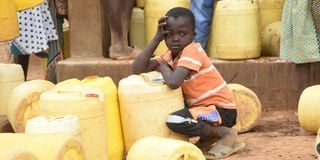
A boy among from an internally displaced family that fled Arabal in Baringo County as a result of constant attacks by bandits and settled in safer grounds in Mbechot area. There have to jostle for water at the only borehole in the area, putting pressure on the only water source.
As one approaches Mbechot area in Baringo South, they are confronted with ugly scenes of people jostling for space at a watering hole.
At a glance, you could be mistaken that they are haggling at a marketplace.
It is only when you move closer do you realise that these families, together with their animals are pushing their way to a water source to quench their thirst.
This is the only water hole in that area, and most of those jostling are victims of bandit attacks who were displaced from their homes in other surrounding villages.
Conflict is rife here because the only borehole serves over 2,000 people and the storage tank is too small to satisfy them. Under the scorching sun, many are too weak to pump the water, instead spending hours on end jostling for it.
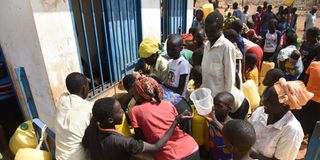
Internally displaced people who fled Arabal in Baringo County as a result of constant attacks by bandits and settled in Mbechot area jostling for water at the only borehole in the area.
Integrated IDPs
The area is made up of Mutaran, Samuran, Mbechot, Ngowe, and Tuitik villages where the banditry victims are integrated with their hosts.
David Cherutich, a village elder says that the scenario was different eight years ago.
“There was nothing like this in the past. The influx of people fleeing their homes in insecurity-prone areas in Mochongoi has resulted in overstretched resources,” he says.
“Some of the victims fled their homes a decade ago and many others have been coming since then. And because they had nowhere else to go and without any property, Mbechot villagers took it upon themselves to host them, resulting in a drastic population explosion,” he explains.
Due to the punishing weather in the area, Japan and Kenya constructed the borehole to serve locals who daily endured a 10-kilometre trek to seek water.
"Alternative power should be installed here to ensure adequate power to pump the water and also a bigger storage tank is needed," said the village elder.
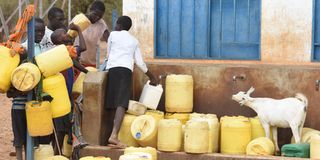
Some of the internally displaced people who fled Arabal in Baringo County as a result of constant attacks by bandits and settled in Mbechot area at the only borehole in the area.
Hunger pangs
The rocky terrain, hot weather conditions, and little water the area has made the conditions worse, and now, hunger is the norm as the sunbaked soils cannot support crops.
In the yester years, a majority of irrigation schemes produced maize, sorghum, millet, green grams, watermelons, and vegetables, among other food crops, significantly alleviating the food insecurity in the area as well as generating income for locals through the sale of surplus yields.
Now, hunger pangs and poverty is the norm.
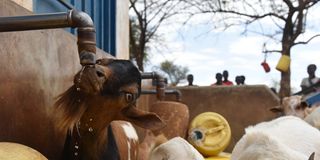
Goats belonging to internally displaced people who fled Arabal in Baringo County as a result of constant attacks by bandits and settled in Mbechot area. There is pressure on the only water resource in the area.
For residents, all they are left with is nostalgic memories of their productive farms in Arabal that brought forth plenty of food and a steady source of income to thousands of residents.
Emmy Kiptoo who fled her home in Arabal in 2013 is nostalgic about the bountiful life before they were violently uprooted from their homes.
“I used to grow maize, beans, mangoes, avocados, and vegetables besides keeping livestock. But due to bandits, all of them went in a flash and since fleeing the area, we are now dependent on casual jobs to fend for our families. Our children have dropped out of school because whatever we get goes to buy food,” she says.
Optimistic
It is the reason Ms Kiptoo, and others, are optimistic that the security operation in the region will flush out bandits terrorizing them and enable them to go back to their homes and jumpstart their livelihoods once more.
Another evictee Linah Kibelion regrets that they lack basic needs, and the situation was getting worse with each passing day.
“We are not only fighting for water but also space even in school for our children. The facilities are overstretched with no relief in sight. We are hoping the operation will give us peace,” she says.
But at Mzee John Kiprop's home, the situation is grave.
For the last week, they have been depending on boiled water for food.
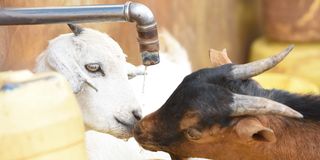
Goats belonging to internally displaced people who fled Arabal in Baringo County as a result of constant attacks by bandits and settled in Mbechot area. There is pressure on the only water resource in the area.
School drop outs
Some of his children dropped out of school and his son who was the top pupil in Mbechot primary school in 2022 KCPE risks repeating Class Eight for the third time since he cannot afford to raise Form One fees.
“In 2010, bandits raided my home and other villages in Arabal and drove away my cattle. The next time they came, we not only lost the goats that survived the first raid, but also our homes and some of our kin. They carted away what they could lay their hands on, burning down what they left behind,” he says.
“Since fleeing, we have remained poor. We live on a well-wisher’s plot that has since been sold off and the new owner now wants us to vacate,” he adds.
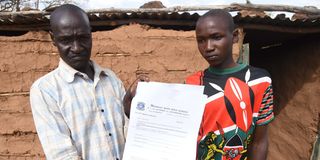
Elvis Koimei, 16, who scored 316 marks in last year's KCPE, and his father John Kiprop showing his admission letter at their home in Mbechot. He was admitted to join Marigat Boys High School on February 19, 2023, but has no school fees.
But what is troubling him most is how to send his son to school. He was supposed to join Marigat Boys, but his father can’t afford the cost. He scored 316 marks and was the top pupil.
Elvis Koimei, 16, did his first KCPE exams in 2021 and got 278 marks but was forced to repeat standard eight for lack of fees for secondary.
“If no one comes to his aid he will either repeat Class Eight or be forced to drop out,” he said.
Mzee Kiprop Kiprop said his situation has been aggravated by failure to get a bursary for his son.
“At Mbechot they claim I come from Arabal. When I go there I am told to go back to Mbechot since I am a resident there. That is how I missed getting the funds,” he says.
[email protected]





